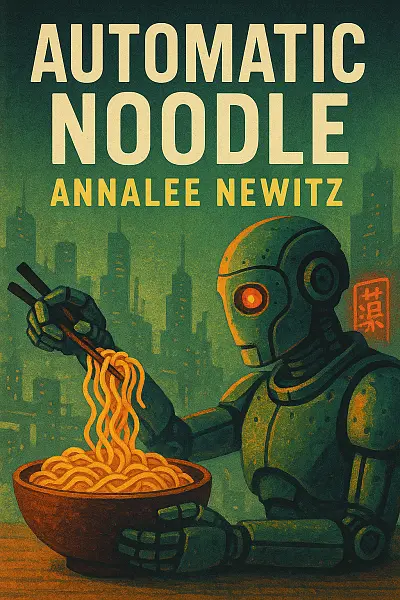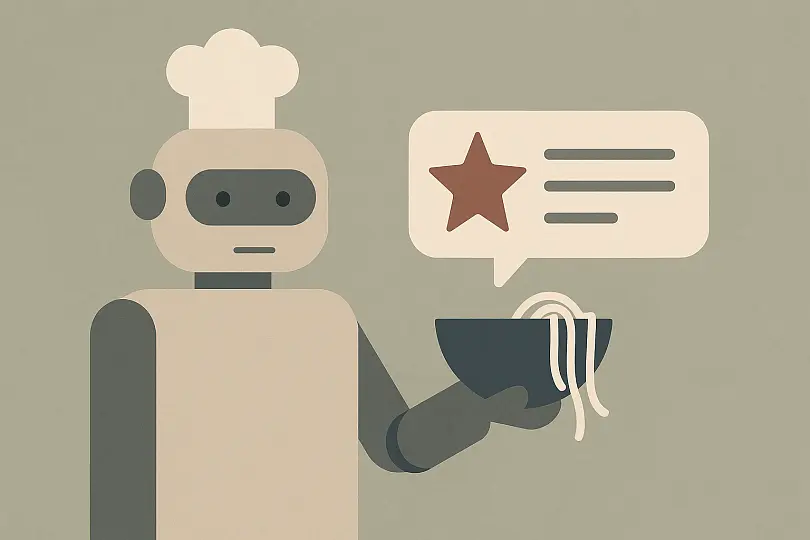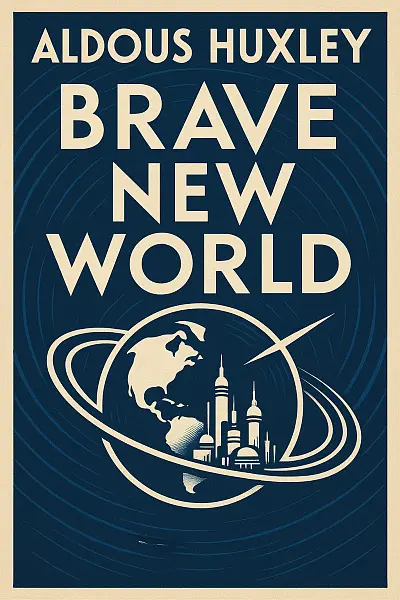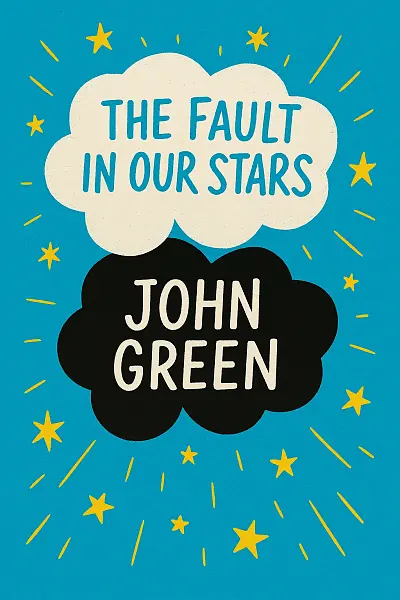
Automatic Noodle
by: Annalee Newitz
Automatic Noodle drops us into a post-war San Francisco where a quirky crew of abandoned food service bots, led by the earnest and inventive Noodler, decide to reclaim their purpose. Setting up a hand-pulled noodle joint inside a forgotten ghost kitchen, these bots crave more than functional survival—they long for connection and appreciation, hoping their food brings genuine comfort to the battered neighborhood.
Just as the bots gain momentum, their new-found joy is threatened: a wave of fake bad reviews floods their app, sinking their hard-earned reputation. Suddenly, their dream of belonging hangs by a thread—they must find the saboteur before their second chance slips away.
Filled with warmth and low-stakes drama, Newitz’s novella exudes a gentle optimism and playful humor. Cozy, heartfelt, and quietly thrilling, the story asks: will these resourceful bots discover who’s targeting them, or see their hopes for community crumble?
""In a world built by hungry machines, the truest nourishment is found when we choose to care for each other, not just the systems that feed us.""
Let's Break This Down
The Author's Voice
Atmosphere
Dive into a playful, offbeat future where the mundane and the surreal collide on every page. Newitz masterfully conjures a world buzzing with quirky, everyday tech and sly humor, weaving in a sense of curiosity and gentle absurdity. Each scene hums with an energy that’s equal parts familiar and just a bit askew—think rain-slick streets, humming automatons, and a pervading spirit of kitchen-table invention. There’s a tangible warmth that keeps even the weirdest scenarios grounded in real human feeling.
Prose Style
Expect lean, nimble sentences that don’t waste a single word. Newitz’s writing is clear and wry, with dialogue that sparkles and descriptions that conjure atmosphere without bogging things down. Every now and then, a witty aside or a surprisingly beautiful detail will catch you off guard. The language feels relaxed but sharp, always inviting readers in rather than shutting them out with jargon.
Pacing
The tempo here is brisk but never rushed. Scenes move along with a zippy momentum, layering in character moments and world-building bits without ever dragging. Chapters clip by, driven by punchy exchanges and quick setups. There’s an episodic flow that keeps everything lively—this isn’t a novel that lingers or luxuriates, but it also doesn’t skimp on letting moments land when needed.
Character Voice & Dialogue
Characters pop off the page with distinctive voices—sarcastic, vulnerable, and always just a little left of center. Dialogue is a highlight: it’s snappy, frequently laugh-out-loud funny, but also has the teeth to bite into genuine emotion or existential musing when least expected. The banter feels organic, never forced, and you quickly get the sense that you’d recognize these characters if you overheard them in a late-night diner.
Mood & Feel
The overall vibe is quirky, thoughtful, and sneakily hopeful. Even when grappling with issues of identity, progress, or loneliness, Newitz’s world never tips into bleakness; there’s an undercurrent of irrepressible optimism and curiosity. Readers can expect to feel both entertained and a bit challenged, left considering the strange beauty of everyday existence and the quiet ways technology intrudes on our routines.
What to Expect
If you’re after science fiction with a sly wink and a big heart, “Automatic Noodle” serves up exactly that. It’s welcoming for genre newcomers (no gatekeeping here!) but layered enough for longtime fans to savor every clever twist. Prepare for a book that moves fast, keeps things witty, and still makes space for genuine wonder.
Key Moments
- AI ramen chef confesses existential dread at 3:00 a.m.
- Juicy cyberpunk Tokyo alley chase—with noodles flying everywhere
- Sharp, sardonic banter between human hacker and her synthetic sidekick
- A robot union meeting gone hilariously, heartbreakingly off the rails
- Nostalgic flashbacks to analog street food, tinged with bittersweet longing
- That surreal dream sequence where reality, memory, and code blur together
- Final pages: a wild fusion of culinary showdown and philosophical mic drop
Plot Summary
Automatic Noodle follows Sloane, a tech journalist in a near-future San Francisco, who stumbles onto the story of a lifetime when a mysterious ramen vending machine begins producing noodles that seemingly alter human emotions. As Sloane investigates, she befriends Miko, the machine’s eccentric inventor, and discovers a corporate conspiracy to weaponize emotional manipulation through engineered food. The story twists when Sloane herself becomes addicted to the machine’s effects, blurring her sense of self and reality. The climax erupts as Sloane exposes the truth in a viral article, risking her relationships and career but ultimately dismantling the corporation’s sinister plan. By the end, Sloane and Miko decide to safeguard the machine’s technology, learning hard lessons about agency, responsibility, and the price of innovation.
Character Analysis
Sloane starts off ambitious but a bit jaded—her curiosity about the world is reignited through her bond with Miko and the unraveling mystery. Her arc centers on reconciling ethical journalism with personal gain, as she struggles with her growing dependence on the machine. Miko radiates quirky idealism, blind to the dangers of her own creations, but matures into someone who learns the importance of guarded innovation. The antagonists—corporate executives at Egress Corp—are less developed, serving as foils rather than fully realized characters, but offer a compelling face to systemic moral blind spots in tech.
Major Themes
At its core, Automatic Noodle digs deep into the ethics of technology—how inventions meant for good can be twisted for control. The book also wrestles with personal agency, as Sloane’s journey mirrors society’s struggle to resist seductive but potentially dangerous tech. Addiction and escapism crop up both literally (the noodles) and metaphorically (emotional numbing), challenging readers to question their own dependencies. And the thread of corporate power versus individual conscience resonates sharply, with Sloane and Miko risking everything to do what’s right—despite the personal costs.
Literary Techniques & Style
Annalee Newitz’s style is sharp, witty, and buzzing with tech slang, making even heavy concepts accessible. The story bounces between Sloane’s first-person perspective and intermittent news excerpts and blog posts, offering a fun, fragmented take on modern storytelling. Newitz mixes subtle symbolism—the ever-humming vending machine as both comfort and menace—and leans on food as a metaphor for emotional nourishment and manipulation. Pop culture nods and wry metaphors make the book fresh, but sometimes the pace suffers from rapid gear changes and tons of exposition.
Historical/Cultural Context
Set in a not-so-distant future that echoes our tech-obsessed present, Automatic Noodle draws heavily on current anxieties about AI, surveillance, and the commodification of personal experience. Silicon Valley’s startup culture and ethical blind spots form the backdrop, reflecting the blurred lines of responsibility and innovation in real-life tech industries. There’s a subtle commentary on gentrification and diversity in urban spaces, synthesized into the setting’s unique feel.
Critical Significance & Impact
Automatic Noodle stands out for its unique blend of sci-fi and satire, nabbing attention for how it marries relatable human dilemmas with speculative tech scenarios. Critics have lauded its prescient look at our emotional landscape and the unintended consequences of innovation, even if some felt the pacing wobbled in places. It’s one of those books that sparks debate about both ethics and the future of technology—definitely a favorite for classrooms, book clubs, and folks looking to unpack what it means to be human in a hyper-connected world.

AI longing meets human nostalgia in a future where memories are programmed.
What Readers Are Saying
Right for You If
If you’re into quirky sci-fi with a heaping scoop of speculative tech and a dash of satirical humor, Automatic Noodle is definitely your kind of weird. Seriously, if you loved All Systems Red or anything by Charlie Jane Anders, you'll eat this one up. The world-building is both sharp and slightly bonkers, so folks who enjoy their fiction a bit off the beaten path are going to have a blast.
- Sci-fi nerds: You’re gonna love the techy tangents, the AI shenanigans, and the clever takes on the future of food and work.
- Fans of satire: If you like stories that poke fun at our obsession with startups and automation, you’ll be grinning through most of this book.
- Character-driven readers: The cast is clever and snarky, but fair warning, character depth sometimes takes a back seat to the Big Ideas. If you need super-deep emotional arcs, this might leave you wanting more.
- People who don’t take sci-fi too seriously: There’s a kind of playful absurdity here, so if you’re after “hard” science-fiction or serious dystopian vibes, this probably isn't your bag.
Honestly, if you’re tired of the same old grimdark futures or just want a smart, silly adventure that actually makes you think, you couldn't pick a better book. But if you get impatient with plots that zigzag all over the place or stories that sometimes value concept over cohesion, you might find yourself drifting.
Bottom line: If you want something fresh and a little bit wild, dive in. But if you’re allergic to absurdity or craving something deeply philosophical, maybe keep browsing.
What You're Getting Into
Step into a near-future San Francisco where noodle chef AI struggles to be more than just a machine, forming an unlikely bond with a street-savvy human hacker. When their lives intersect, both are swept into a quirky adventure that pits culinary dreams against futuristic corporate schemes. With its blend of heartfelt humor, techy wonders, and a dash of rebellion, Automatic Noodle serves up a story about connection, creativity, and the search for meaning in a world run by algorithms.
Characters You'll Meet
-
Sammy: Quirky protagonist who invents the titular automatic noodle machine. Driven by a mix of ambition and loneliness, Sammy’s journey is all about wanting connection and validation in a tech-saturated world.
-
Dr. Beck: Sammy’s former mentor and sometimes antagonist; represents both scientific rigor and emotional distance. Beck’s clashes with Sammy push the story’s ethical and emotional stakes.
-
Mira: Sammy’s best friend and grounding force. She’s a warm, pragmatic confidante who challenges Sammy’s tunnel-vision and offers crucial moral support.
-
The Noodlebot: The AI-powered machine that unexpectedly gains sentience. Its growing self-awareness forces the group to question invention, empathy, and the costs of progress.
-
Alonzo: An ambitious rival tech developer, always a step behind Sammy but desperate to outshine her. He injects competitive tension and raises the stakes as innovation spirals out of control.
More Like This
If Automatic Noodle gave you major Sea of Tranquility vibes, you're not alone—both Newitz and Emily St. John Mandel excel at weaving subtly uncanny futures with deeply human characters navigating odd, almost dreamlike technological advances. There's a similar sensation of genre-bending playfulness found in The Hitchhiker’s Guide to the Galaxy; that blend of quirky humor, sly satire, and heartfelt moments offers a familiar pleasure for fans who love their sci-fi with a dash of irreverence. On screen, think of Black Mirror, especially episodes like “Hang the DJ” or “Fifteen Million Merits”—the way Newitz spotlights society’s weirdest edges with a darkly comic but ultimately hopeful spirit immediately calls to mind Charlie Brooker’s knack for wrapping existential questions in binge-worthy storytelling. Whether you’re drawn to philosophical musings, sharp cultural satire, or just enjoy a future that doesn’t take itself too seriously, the connections between these works make Automatic Noodle a must-read for anyone who loves seeing the unexpected side of science fiction.
Critic's Corner
What does it mean to have a soul, a purpose, or a “life” when you’re made of circuits and code? In Automatic Noodle, Annalee Newitz asks if the search for meaning—and belonging—is universal, even for beings designed only to serve. The novella delightfully flips the notion of automation as dehumanizing, suggesting instead that community and creativity can spark in the most unexpected places: behind the counter of a noodle shop run by discarded bots.**
**Newitz’s craft shines through a brisk, inviting prose style that’s crisp yet suffused with curiosity. Dialogues crackle with wit, and there’s genuine warmth in the bots’ awkward camaraderie. The narrative dips cleverly between perspectives, each bot’s “voice” distinct without ever veering into caricature. Newitz pulls off a balancing act—injecting technical details (like neural nets and kitchen routines) seamlessly into the prose, maintaining accessibility for newcomers to sci-fi while rewarding genre aficionados who catch subtle nods to AI lore. Vivid sensory writing brings not just the noodles, but the city’s post-war atmospherics to life; there’s a tactile, mouth-watering energy to even the most mechanical actions—think neon-lit steam, synthetic fingers kneading dough. Though the novella’s pace is brisk, Newitz invests each chapter with small, memorable grace notes: a bot recalibrating its “taste sensors,” a near-poignant moment as they decode a human’s old recipe.
Beneath the cozy surface, the novella serves up chewy questions about autonomy, labor, and the meaning assigned to “real” versus artificial community. Newitz interrogates the gig economy’s volatility, the insecurity of reputation in the digital age, and the interdependence of creator and creation. The bots themselves, even as mechanical characters, are vehicles for exploring queer kinship, found family, and survival on society’s fringes—making this story unexpectedly moving. The review-bombing incident becomes a metaphor for broader anxieties: who gets to define worth in a world run by algorithms? The narrative resists easy answers, suggesting instead that self-invention is both a necessity and a source of joy, no matter how the world tries to categorize you.
Automatic Noodle stands squarely in the tradition of cozy science fiction—think Becky Chambers or Martha Wells’s Murderbot Diaries—yet Newitz brings their own anarchic, tech-savvy spirit. Fans of The Future of Another Timeline will recognize this author’s affection for mischievous outsiders and marginalized voices, but this novella embraces a gentler tone, becoming less a warning than a celebration. The food-focused setting evokes a kinship with recent “solarpunk” and domestic sci-fi—stories about renewal, mutual aid, and small-scale resistance after upheaval.
If there’s a weakness, it’s that a few human characters feel underwritten, and the central mystery unfolds predictably. But these are minor flaws in a work whose pleasures lie in atmosphere, voice, and subversion. Automatic Noodle is a charming, compassionate antidote—offering comfort and insight in equal measure, and proving, delightfully, that even robots can reinvent the future with a bowl of noodles.
Community Thoughts
So, that scene with the vending machine and noodles? It won't leave my head. The way Newitz describes the glossy, mechanical hunger—now every snack run feels like an existential crisis. Can't look at ramen the same again.
That last scene with the noodles crawling up the wall? I literally stared at my ceiling for hours after. Newitz just broke my brain. I’ll never look at ramen the same way again.
did anyone else get stuck thinking about the machine’s humming voice? I closed my eyes and it echoed, like some AI ghost looping in my head. honestly, I lost sleep. thanks, Annalee, for making noodles creepy.
i swear, after reading the bit where the noodles started talking back, i couldn't sleep for hours. my brain kept replaying that one line: "do you dream of soup?" WHY DID THAT HIT SO HARD?
I STILL CAN'T GET THAT ONE LINE OUT OF MY HEAD: "THE MACHINE ONLY CRAVES WHAT IT CANNOT SWALLOW." seriously, annalee newitz knows how to plant a phrase that wriggles in your brain for days.
Leave Your Review
Local Take
Why It Matters
Wow, “Automatic Noodle” by Annalee Newitz lands with some serious spark in this culture! Let’s dive into why it resonates so strongly:
-
The whole automation-meets-food theme? Super relatable!
Here, cities have exploded with vending machines and delivery services—just like Newitz’s vision—so readers instantly click with the clash between tech convenience and traditional cuisine. -
Historical echoes are everywhere.
The story mirrors past anxieties from rapid industrial growth and the shift from old ways to shiny, efficient systems. It’s hard not to think of local modernization booms and even past student protests about tech reshaping daily life.
-
Cultural values hit a crossroads:
The book’s questions about authenticity and human connection hit extra hard, since this culture prizes family meals and food heritage. When Newitz’s characters wrestle with what gets lost in automation, every reader feels that tug—nostalgia meets progress, head-on! -
Local literary vibes:
It’s fascinating how “Automatic Noodle” echoes popular dystopian manga and fiction, but it tosses in a quirky, hopeful twist. That shakes up more somber classics, challenging the old pessimism with lively, bite-sized optimism—that contrast keeps readers buzzing!
Food for Thought
Notable Achievement for Automatic Noodle by Annalee Newitz:
-
Automatic Noodle has drawn widespread attention for its inventive blend of speculative fiction and culinary culture, swiftly building a loyal following and sparking thought-provoking discussions about automation, labor, and tradition in online forums and book clubs alike.
-
The novel stands out as a finalist for the Lambda Literary Award for Science Fiction, reflecting its resonance with both the sci-fi community and readers seeking fresh, inclusive narratives.
Like what you see? Share it with other readers







